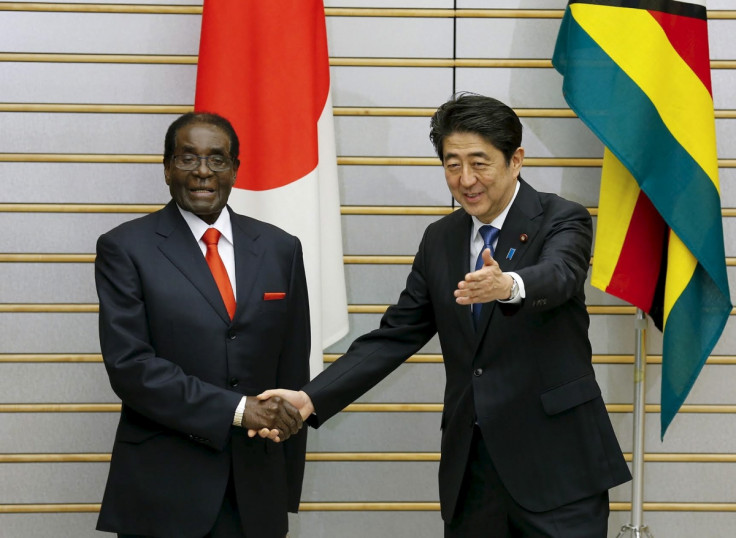Zimbabwe secures $5m food aid deal as President Robert Mugabe courts PM Shinzo Abe

The Japanese Prime Minister Shinzo Abe has awarded Zimbabwe's President Robert Mugabe ¥600m (US$5m) of financial assistance in order to help bring more Japanese companies back to the resource-rich country.
At a joint news conference after bilateral summit talks with Mugabe on Monday (28 March), Abe promised financial assistance to fund a road project in the former economic powerhouse, insisting Japan would continue a close consultation with the Zimbabwean authorities to counter acute food shortages in the African nation.
Relations between both countries hit a low in 2000 when Japan suspended technical cooperation (except for humanitarian aid), after Mugabe carried out the 2000 Fast Track Land Reform Programme, prompting the West to impose sanctions on the African nation.
Since 2012, however, Zimbabwe-Japan relations have improved, with the new grant-in-aid being Japan's second since November 2015, when the Asian nation extended a $15m grant to Zimbabwe for an irrigation project - its first serious commitment in 15 years.
Mugabe's five-day visit came as Abe looked to check China's growing influence in the African continent.
Mugabe invites Japanese firms
Mugabe is now hoping to solidify the nation's Look East policy by boosting investment and economic cooperation deals with Abe.
At the news conference, Mugabe, called on Japanese companies to up their investments in Zimbabwe, adding that the firms can benefit from special economic zones in the country. "Zimbabwe doors are open to the Japanese investors and they should look forward to a mutually rewarding relationship with us," Mugabe, who is 92, told reporters on Monday (28 March).
Once considered an agricultural powerhouse, Zimbabwe - which declared a 'state of disaster' as over a quarter of the population faces food shortages due to a severe regional drought - urgently needs to attract foreign direct investment to drive the economic development agenda.
However, the nation's economy plunged after the United States, Canada, and the European Union imposed economic sanctions following Mugabe's 2000 Land reform program. Sanctions were eased in 2014 and the EU resumed direct investments last year, but the country's economy has continued to decline over a 16 year period.
Turning a blind eye to rights abuses
There is a widespread consensus about human rights abuses in Zimbabwe - especially towards suspected members of the political opposition, including executions, torture, death threats, kidnappings, unlawful arrest and detentions - and Western nations have accused China - and now Japan - of turning a blind eye to these abuses.
At least 20,000 people died in the ethnic cleansing carried out by Mugabe's Fifth Brigade troops - known for burning people alive or forcing them to dig their own graves in public executions - during the country's 1990s violence.
One of the most controversial politicians on the continent, Mugabe also strongly opposes to LGBT rights. The president gave an insight into his ideological credentials when he compared himself to Hitler, during a state funeral of one of his cabinet members in 2003.
In March 2008, after he lost a presidential election to leader of the opposing Movement for Democratic Change (MDC) Morgan Tsvangirai, Mugabe demanded a recount. MDC supporters were attacked and killed by Mugabe's henchmen and Tsvangirai later withdrew.
© Copyright IBTimes 2025. All rights reserved.





















